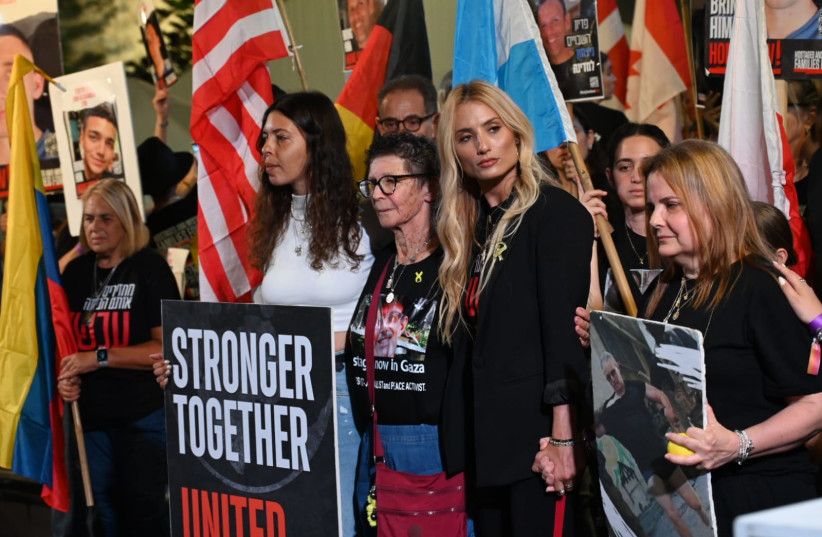The State of Israel is not the kind of country in which it makes sense to have children and set up a family as long as people are taken hostage and not brought home, said multiple family members of hostages held by Hamas.
They spoke as thousands flocked to and gathered in Jerusalem to call on the government to do everything it could to bring the hostages home and condemn it for not doing enough.
The family members, who are part of “Hasamba,” an organization of young family members of hostages, spoke at a conference on impacting public opinion in wartime held jointly by the Hostage Family Forum and additional partners such as the City of Sderot.
As young people, the members of Hasamba are facing “the question of if and where to start families, “ said Gil Dickmann, the cousin of hostage Carmel Gat. “We won’t do this in a place where hostages are not brought home,” he explained.
Hasamba was founded on the 200th day of captivity for those held hostage by Hamas. It was founded when Ella Ben Ami, daughter of hostage Ohad Ben Ami and Raz Ben Ami who was released in the November deal, noticed that while the 100-day mark had brought many thousands of Israelis out to rallies for the hostages, the 200th day had not.

Worn out demonstrators
Mor Korngold said he feels his parents are worn out and no longer able to cry out for his brother Tal Shoham, who is in Hamas captivity. It falls to him to do this now, in part through his work with the young organization.
The members of the organization feel that as young people fighting for the release of the hostages, they are fighting for the future of the country, and refuse to give up on the future.
“We understood that how we [fight for the hostages] will impact the future of the state, “ said Yarden Gonen, sister of hostage Romi Gonen.
One element of how the group is fighting for the hostages is by not attempting to become spokespeople or PR professionals, but simply by being themselves – people deeply impacted by the well-being of the hostages and the status of a hostage deal.
“I try to remind people that when discussing a deal, they are talking about human life,” said Korngold. “I ask them to remember Naveh and Yahel,” he said, naming his niece and nephew who are growing up without their father, Tal.
While they are not PR professionals, many members of the organization have become the de-facto faces of the fight for the hostages. Gonen recently made waves in a media appearance that ended in the firing of political commentator Briahna Joy Gray from The Hill.
Gray was widely criticized online before being fired after her treatment of Gonen and visibly rolling her eyes after Gonen asked her to believe all women about experiencing sex offenses, in an interview earlier this month that went viral.
Gonen ended up on the show after seeing Gray in multiple interviews doubting the testimonies and evidence of women who had been sexually assaulted by Hamas. She asked to be interviewed by Gray so that she could confront her about believing women’s testimonies, she recounted.
“I can’t believe it blew up the way it did,” Gonen commented on the incident and subsequent firing.
While Gonen said she isn’t in favor of firing people, she is in favor of organizations setting limits. “I’ve never been spoken to [the way Gray spoke to me] in any other interview,” she said.
“Karma is a b****,” she summed up.
Ben Ami closed the panel by calling on Israelis to wake up.
“Speak up and make a difference, “ she told the audience. “You have the power.”
